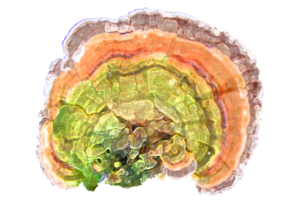Motomichi Torisu, Yoshihiko Hayashi, Toshiyuki Ishimitsu, Takeshi Fujimura, Kazunori Iwasaki, Mitsuo Katano, Hiroshi Yamamoto, Yutaka Kimura, Masaharu Takesue, Motoharu Kondo, Kikuo Nomoto
Abstract
To examine the clinical efficacy and the mechanism of action of polysaccharide K (PSK), a proteinbound polysaccharide extracted from a Basidiomycetes fungus, a randomized double-blind trial was performed by administering PSK to 56 patients and a placebo to another group of 55 patients after surgical operations on their colorectal cancers. The rate of patients in remission (or disease-free) was significantly higher in the PSK group than in the placebo group; the difference between both groups was statistically significant atP <0.05 by the logrank test. The survival rate of patients was also significantly (P <0.05) higher in the PSK group than in the control group. The most significant laboratory finding was that polymorphonuclear leukocytes from PSK-treated patients showed remarkable enhancement in their activities, such as random and/or chemotactic locomotion, and phagocytic activity, when compared with those in the control group. In conclusion, PSK was useful as a maintenance therapy for patients after their curative surgical operations for colorectal cancer. The beneficial effects were probably due to the activation of leukocyte functions as one of the many biological-response-modifying (activities induced by PSK).
Reference:
Cancer Immunology, Immunotherapy, September 1990, Volume 31, Issue 5, pp 261–268

